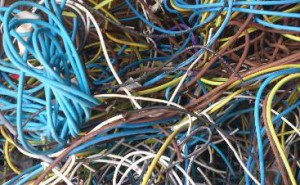later post | index | earlier post
What is WEEE waste?
Wednesday, 17 January 2024

Waste electrical items can have a harmful effect on the environment as well as animal and human health. The WEEE regulations aim to reduce the potential impact of waste electricals in landfill by encouraging recycling, minimising waste and incentivising the production of more environmentally friendly products.
The WEEE regulations are a producer compliance scheme that makes those that generate new products responsible for the safe recycling and recovery of end-of-life waste electrical and electronic equipment.
What does WEEE stand for?
‘WEEE’ is an acronym standing for ‘Waste Electrical and Electronic Equipment’. This definition applies to all end-of-life electrical and electronic equipment (generally anything with a plug or battery), divided into either household or non-household electrical waste products.
About the WEEE regulations
The Waste Electrical and Electronic Equipment Directive (WEEE Directive) first became law in 2003 as part of a European Union (EU) initiative. In essence, it makes the companies who manufacture and distribute such equipment responsible for its disposal.
The Directive was adopted by the UK in 2006, having since been replaced by the Waste Electrical and Electronic Equipment Regulations 2013. This legislation established the requirements for the recycling and recovery, reuse and treatment of waste electrical products
Before the WEEE Directive was introduced in the UK, waste electrical and electronic goods were mixed up in municipal/household waste. Since 2006, however, WEEE recycling has become a rapidly growing sub-sector, ever more essential to the national economy.
What are WEEE recycling requirements?
The law makes it clear that the producers of electrical and electronic equipment are financially responsible for the environmental impact of goods they place on the market, particularly at the point that those goods become ‘waste’.
Effectively, all producers are therefore required to manage the recycling and recovery of WEEE. To facilitate this, all producers are obliged to register with or create a registered compliance scheme.
Failure to follow these waste regulations can result in a fine of up to £5,000, as well as the possibility of prosecution.
What is WEEE scrap?
There are ten categories outlined in the current version of WEEE legislation. These are:
- Larger household appliances (e.g. fridges, cookers, washing machines)
- Smaller appliances (e.g. vacuum cleaners, irons, toasters)
- Telecommunications equipment (e.g. computers, printers, cables)
- Consumer equipment (e.g. radios, TVs, camcorders)
- Lighting equipment (e.g. lamps, fluorescent tubes)
- Electrical tools (e.g. drills, sewing machines, saws)
- Toys and leisure (e.g. gaming consoles, battery-powered toys, exercise machines)
- Medical devices (e.g. dialysis machines, analysers, medical freezers)
- Monitoring and control equipment (e.g. smoke detectors, thermostats)
- Automatic dispensers (e.g. drink, food and cash dispensers)
Find the latest information on the WEEE regulations.
How does WEEE recycling work?
Legally obliged to handle their waste in accordance with WEEE regulations, businesses have what is deemed a “duty of care” relating to how the electrical waste they produce is stored, moved and disposed of. This duty of care applies from the moment the electrical or electronic product is created, through to the moment it is recovered, recycled and/or destroyed.
As WEEE items are often extremely complex, they can be tricky to recycle. The exact treatment of these goods is bound to vary, depending upon the category of WEEE and the technology required to handle them. Indeed, it is not uncommon for waste electronics to contain a number of hazardous materials, such as arsenic, cadmium, lead and mercury, amongst others.
As a result, it’s required by law that companies responsible for directly recycling WEEE items are experienced and licensed to deal with the materials. Waste collection companies require a Waste Carriers’ Licence, while WEEE recycling and treatment facilities must be registered as an Approved Authorised Treatment Facility (AATF).
WEEE collection and disposal
It is worth noting that nothing about these regulations imply a company (or obligated producer) must physically dispose of electrical waste themselves. Usually, such arrangements are made during the process of signing up for a registered compliance scheme.
Most organisations choose to fulfil their obligations by arranging for a licensed AATF to manage all aspects of the WEEE recycling process.
The WEEE regulations ensure that businesses minimise the environmental impact of electrical and electronic equipment they produce. With the UK disposing around two million tonnes of such equipment every year, it’s essential that goods are recycled and repaired – rather than spilling toxins and other pollutants into landfill.
WEEE recycling at ASM
ASM Metal Recycling is an AATF, so we can accept and process your waste electrical products, and support the efforts of UK industries to reduce the electronic waste the country generates. From one-off collections to regular consignments of redundant electrical equipment, our team can work around your business’s WEEE recycling requirements.
If you are a producer or manufacturer of electrical and electronic equipment in and around the Aylesbury area we can help your organisation to meet WEEE recycling requirements. Contact us today to find out more.
later post | index | earlier post
Recent posts
- What to do with radioactive scrap metal
- How does metal recycling benefit the economy and the environment?
- 5 common metals that can be recycled
- How does metal recycling work?
- How to Sort Metal for Scrap
- How to classify the different types of waste your business produces
- What is WEEE waste?
- Can iron be recycled in the UK?
- What has the most copper in it to scrap?
- How to better understand scrap metal pricing
- Is there a link between copper and brass prices?
- How to make money from cable scrap
- How many different types of copper are there?
- What can I sell to a scrap metal yard?
- Preparing for the collection of scrap metal